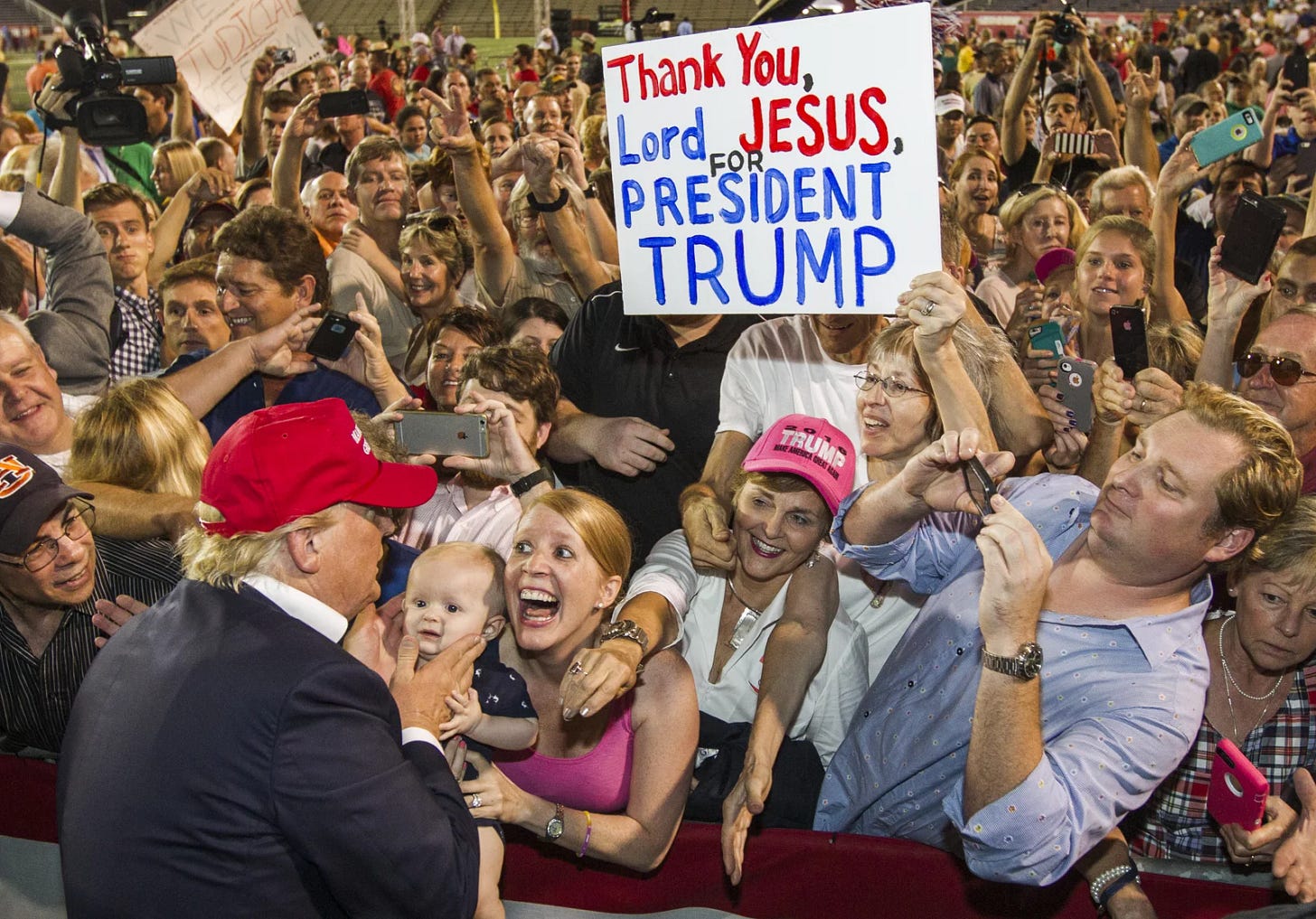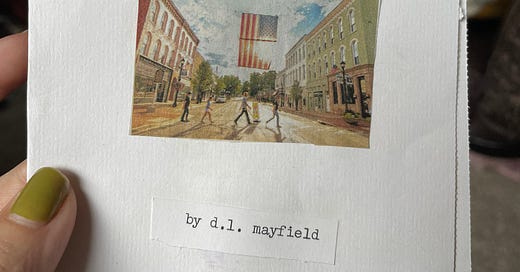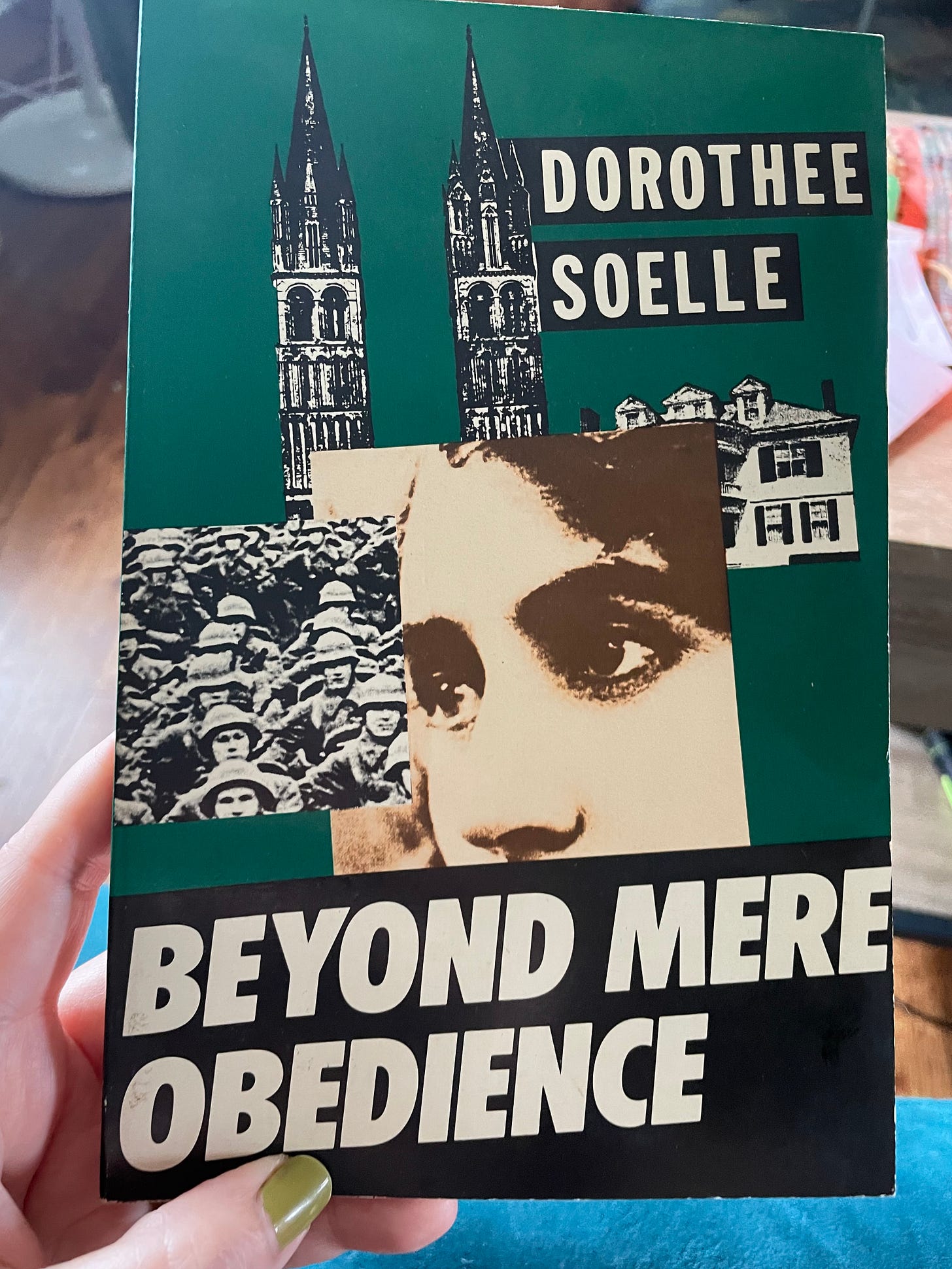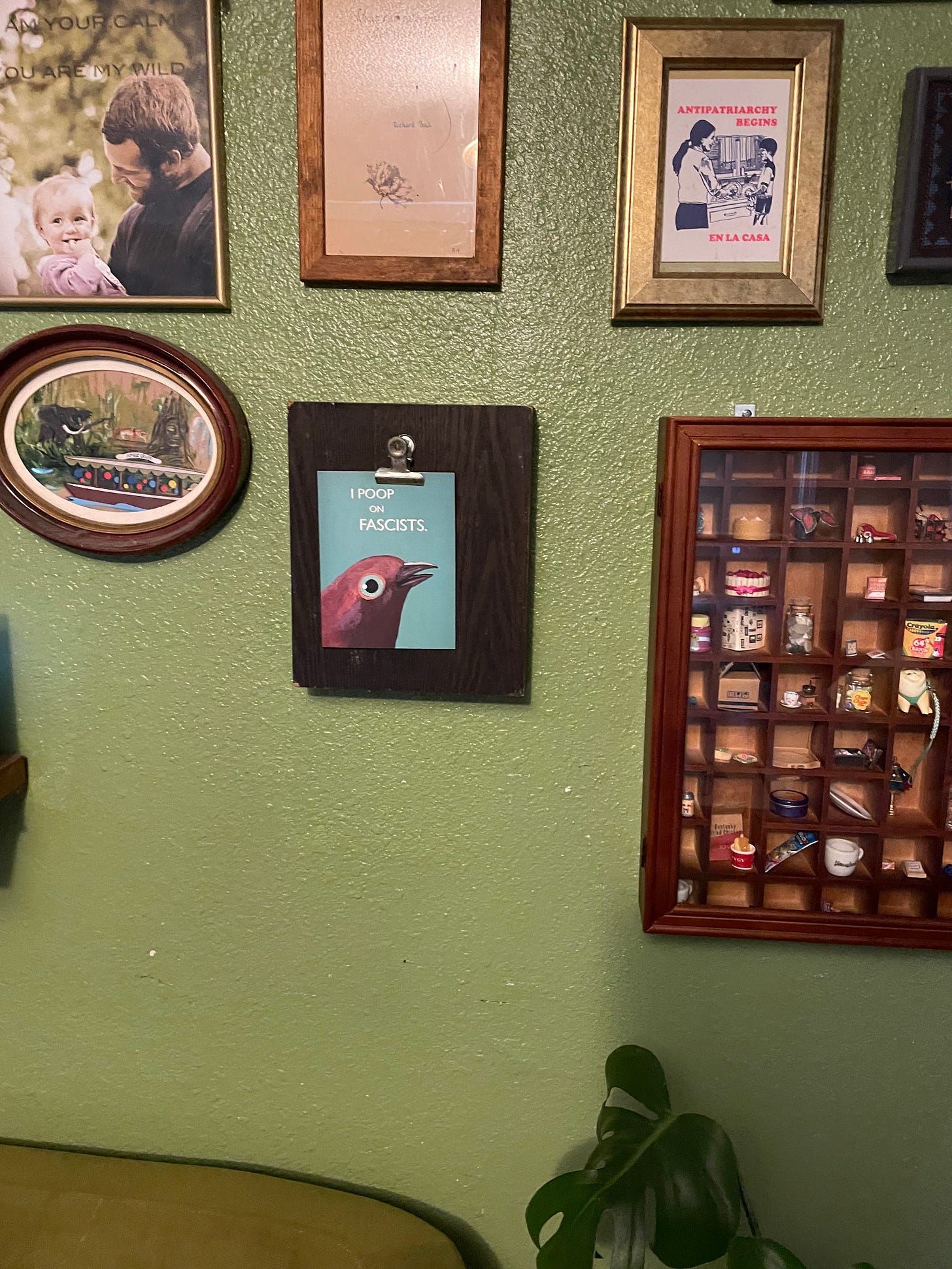What is authoritarianism? What is fascism?
And why oh why do we need to learn what these ideologies are?
Welcome to Healing is My Special Interest, the newsletter at the intersection of late-diagnosed neurodivergence and healing from high control environments. If you have been following my writing, you know that I am currently knee-deep into researching authoritarian parenting methods of white evangelicalism and that has led me to research fascism in-depth for the first time. I know these topics can be really weighty, but I trust that we can take care of ourselves and feel our feelings and dig into facing and naming our reality here in the US (and elsewhere). Thanks for being here, and for supporting this newsletter. It truly, truly means the world to me.
Healing from authoritarianism is my special interest these days. Which kindof sucks, actually, since authoritarianism is on the rise (should we title the next few months The Anti-Fascist Fall? Or is that too much???). But for reals, how do you heal from something while you are in the midst of it? How do you heal from something that is actively harming others and—if given the chance—will gleefully enact more harm?
Oh, you thought I had the answers to those questions? Unfortunately, I don’t. But I am a curious human who has survived a LOT of shit, and I think that asking these questions and muddling through our answers together is the only way I am going to get through this. I hope you will be able to take care of yourself and take some deep breaths and hopefully stick with me on this journey of naming our reality. And I promise to keep being weird and talk about pleasure and healing our nervous systems, because I truly, truly believe they are all connected.
//
Krispin (my partner) said I probably should start by explaining what authoritarianism and fascism is. So that’s what I will try to do over the next few weeks and months, because this is a topic that unfortunately isn’t going away any time soon. And I hope you will stick with me as we wade into these waters—because I don’t think it is all that different from what I have been writing about all this time. I’m not an expert but I am someone who, in their own way, has been trying to make sense of being born and heavily indoctrinated into a Christian fascist worldview. I have clawed my way out, and now that I have an accurate name for the worldview I was pressured into believing as Truth, I am not going to stop using the correct terms. Because I think it matters.
As an autistic person, there is a palpable sense of relief for me when something is accurately named and identified. I had this sense of relief when I finally was able to identify my child as autistic, then again be able to use that framework for myself. I was relieved when I could research childhood religious indoctrination and religious trauma syndrome and see my own story as a homeschooled pastor’s kid pressured into dedicating my life to “god”/missions. I was relieved when I learned about CPTSD, both the causes of it and the tell-tale symptoms that are the hallmarks of people who experienced long-term trauma in childhood. Of course there were so many other emotions involved besides relief—fear, denial, grief for instance—and it took years for many of these concepts to finally worm their way into my heart. But once I understood my own story in the light of historical, sociological, psychological, and familial patterns—it really helped combat my anxiety and chronic shame (thanks, CPTSD and undiagnosed autism!). While I am still responsible for my own feelings, actions, and impacts, it really helps to name the systems that shape and mold us—especially those that oppress us and others but operate by convincing us to hate ourselves instead of the system.
I have spent the past however many years (decades) trying to make the religion I was born into good news. This was my parents greatest wish, and I tried so, so hard. But it only made me hate myself and trying to make it good kept me from seeing the entire picture of what I was born and indoctrinated into. I was spinning my wheels theologically, when right in front of me a concrete historical experience was happening:
I was born into white American evangelicalism, a religion that caters to the aggrieved white lower-middle class and that promotes authoritarianism as the only god-ordained way to live. These elements combine, in the present and in history, to produce fascists movements and eventual tyrannical governments.
And I think the only way to prevent white evangelicals from implementing their hellish view of a non-democratic society is to accurately name their ideology as explicitly fascist.
//
Now, I know the word fascism has been thrown around recently on social media1, but I (and every smart writer/thinker I follow) who is using the term has been cautioned against saying it aloud it for many, many years2. We are risking our reputations and our livelihoods by using the word fascism—precisely because it butts up against the idea that Americans have of themselves. It is the true “f” word in American politics3, because part of being born in America is to be told, over and over again, that we live in a functioning democracy and that authoritarianism cannot happen here. There is almost a horror of even suggesting the possibility4! Don’t all of our movies point out how BAD the Nazi’s were and how good we are? How in the world could we be growing a large fascist movement in the United States in front of everyone?
This is actually a question that has been asked after every fascist movement by the people who lived through it. Wilhelm Reich, an Austrian psychologist living in Germany wrote The Mass Psychology of Fascism directly after Hitler came to power. He used psychoanalytics to answer the question plaguing him: what causes people to vote against their own interest? To love and vote into power authoritarian leaders who lie through their teeth (and who only truly support corporations) instead of supporting unions and the rights of workers and the chance to be governed democratically by the actual people making up society?
Reich and many others since 1933 have consistently pointed out that fascism has a pattern when it comes to who supports it: fascism is what happens when the aggrieved lower-middle class are manipulated into becoming enthusiastic supporters of an authoritarian leader who promises to privilege and prioritize them5. People caught up into fascism—a rabid desire for a strong man/leader/father/fuhrer to make their country great again—are people who have sought out communities and media which will confirm what they have always known: they are the pinnacle of humanity and deserve to be in power. They have been coached into feeling embattled on every side by people who are taking away their rights and jobs and religions. They have been told they deserve a place where they are upheld and treated like the good Christian American patriots that they are. It makes sense that many fascist movements have played up white grievance to horrific levels, as all the ideology matches up to people who have supremacist beliefs about both their whiteness and their Christianity—and are more than happy to transfer these values to “America” if it is led by the likes of someone strong enough to fight for them and punish all others.

//
Fascism, at its root, is a particular flavor of authoritarianism—the belief that countries need a good, strong, (godly) leader to protect them from the uneducated masses and the scary “other.” Authoritarianism has obviously shaped so many nations and countries throughout time, and democracy stands in somewhat recent opposition to this political system.
Matthew C. MacWilliams writes often about American authoritarianism (and I recommend his short, readable, and intense book, On Fascism: 12 Lessons from American History). In this article for Politico, he juxtaposes authoritarianism against democracy, which I think is a really helpful rhetorical tool. Authoritarianism isn’t just bad or dangerous—it is antithetical to the principles of democracy6. But as MacWilliams writes, the thing about authoritarianism is that it is a movement based on feelings and not facts. As he writes: “Authoritarianism is best understood not as a policy preference, the way we talk about lower taxes or strong defense, but rather as a worldview that can be “activated” in the right historical moment by anyone with a big enough megaphone who is willing to play on voters’ fears and insecurities. When activated by fear, authoritarian-leaning Americans are predisposed to trade civil liberties for strongman solutions to secure law and order; and they are ready to strip civil liberties from those defined as the “other”—a far cry from the image of America as a country built on a shared commitment to liberty and democratic governance.”
Most important for all of us reading this: authoritarianism does not want a pluralistic society governed through democratic means to make sure the voices of all the people are heard when making decisions.
In fact, fascism is actively and explicitly against this democratic ideal.
And the sooner we can absorb this truth, and name it for exactly what it is, the sooner we can resist it effectively.
//
Benito Mussolini was the first person to coin the term “fascism” and he developed his political strategy based off of how to control men and their passions—by getting them to spend their entire lives in perpetual warfare and devoted to the State7. You can read his ten page treatise on fascism he published in 1933, but I think this point is incredibly interesting: “Fascism is therefore opposed to that form of democracy which equates a nation to the majority, lowering it to the level of the largest number; but it is the purest form of democracy if the nation be considered as it should be from the point of view of quality rather than quantity.”
Ok, that’s a mouthful but here’s the important part: Mussolini, similar to many members of the Republican Party in the US, seemed to think that if he called his framework a democracy then people would believe it was one—while actively eradicating all the elements that make it a democracy. Fascism is about “quality opinions” from qualified men devoted to the State, and getting the masses by any means necessary to agree with the State—not about gathering diverse viewpoints from all citizens. What is not said by Mussolini in his screed is what happens to those who do dissent in a fascist “democracy.” Well, we have sadly seen exactly what happens in nations where fascism is democratically elected into power. Dissent is not only silenced, it is eradicated by increasingly violent means.
This article from Time magazine in 2019 does a great job of giving a short history lesson on Italian fascism and characteristic elements to the movement being “the hyper-nationalism, the leader cult, the idea that this is a leader who is going to save us, the fear of white population decline, anti-feminism, anti-left, things like that.” Sound eerily familiar? You can also read Italian writer Umberto Eco’s short analysis of the 14 ways fascist beliefs show up in a population and decide if you think any of them match up to people you might know who are Christian, conservative, and white (it sure does for me!).
America’s brand of fascism just so happens to be explicitly Christian in nature, and we will be getting into that in future newsletters. For now, let me point you to a few resources: in 2021, writer Paul Bower wrote an excellent analysis close on the heels of January 6th (a fascist wanna-be-coup with explicitly Christian overtones). Here are his definitions of the key terms: “by fascism, I mean the pattern of populist ultranationalism, racial grievance, and violent paramilitary action that was first formulated in Mussolini’s Italy and re-emerged in different forms from Hitler’s Germany to Bolsonaro’s Brazil . . . by Christofascism, I mean the adoption of fascist doctrines by the Christian church. It happened in Germany and Bolivia, and to some extent it has already happened here.”
Paul also mentions a German theologian I am quickly becoming obsessed with, Dorothee Soelle, who is the person to first coin the term “christofascism” in the early 1970s. Dorothee studied her own history as a German, a Christian, and a woman, and found that all three of her intersectionalities had primed her towards obedience. It had primed her for authoritarianism. She took on the heroic work of interrogating her socialization, and found liberation as she resisted fascist thinking in her life. When she studied in and observed the US, she found the seeds of fascist thought already gaining prominence on the American Right. As Paul Bower shows us, Dorothee not only had definitions of fascism but she saw the major arcs or themes of the ideology here in the US: “1) U.S. superiority; 2) the veneration of work8 and, in the inverse, cruelty toward those who depend on welfare or solidarity; and 3) the lionization of the patriarchal nuclear family and, in the inverse, the demonization of sexual and gender minorities.”
If this was apparent in the 1970s and 80s to a German liberation theologian who had studied fascism in great detail, I can’t imagine what Dorothee would say about the US today. Perhaps she would say we are much closer to Germany in 1932 on the eve of Hitler’s election than we would like to think. By 1933 it was too late for people hoping to logically debate followers of Hitler’s National Socialist German Workers Party9. The Fuhrer had been put into power, and he quickly set about dismantling the government into a fascist dictatorship. And the fallout for Germans not understanding the danger they were in until too late?
An incalculable amount of death, pain, and suffering, the brunt of which was born by Jewish people—an extreme minority in Germany. And what was all of this death for? Why did it happen?
Because a group of people who had played by the rules of a white supremacist capitalist patriarchal heteronormative society discovered they were miserable in the systems they were told were “good” and they were terrified about their future. And instead of turning their ire at the systems that oppressed them and so many others, they turned their fear and anger elsewhere. They turned it onto the people who couldn’t or wouldn’t conform to the rules and who seemed to be thriving (or at least surviving) anyway. Immigrants, refugees, Black and Indigenous and Asian communities, queer people and the disabled and fat people and the chronically ill, women and children and animals and the earth. They turned their hatred onto those who dared to be their true selves, and they voted eagerly for the loudest person who said that the heathens would be punished but the true believers would be rewarded if they followed the party line. That’s my definition of fascism, I guess. And I think it’s the most accurate name for what has been and is currently happening in the US.
And if we don’t resist it, all of us—then it could get voted into power again. And this time, they won’t be playing around.
//
Sorry to end it today on an intense note. Grab yourself an ice pack and put it on your chest, take a gummy, grab your art journal, listen to some bad-ass protest and resistance music and feel your feelings about this! This is fucking fascism we are talking about here! If you are similar to me, then you were born / swept up into a Christian fascist movement that plans on dismantling the American democracy in January of 202510! I think this calls for a LOT of feelings and a whole lot of processing in a safe community. And cake, of course (or whatever coping mechanisms you love. I am partial to collecting weird anti-fascist art right now).
But for reals, read through the definitions of fascism again, look into a few books or podcasts or audiobooks on what fascism is. Look at who is calling it that in America currently, and notice how it is usually Jewish folks and Black people and queer people—heck, anyone who has been one of the “others” in the fascist bullseye. And don’t you think they could use your support? Your clear-eyed assessment of the situation? Your big feelings and your deep desire to actually live in a country that IS a democracy, where all humans DO have human rights and a voice in the governance of the nation where they live?
We need you here. And we need you to understand the gravity of the situation--while also not succumbing to the pits of despair. Fascism is a historical reality. Fascism is a current reality. But it is not hopeless, not at all. I have a lot of hope for the future, actually. All the labor movement gains and all the strikes and unions organizing are extremely good signs in the US. The slow growth of people naming our reality as fascist is so helpful for those of us who want to know how to resist. And the communities most vilified by the Christian fascists in the US have been organizing, protesting, and resisting for decades (if not centuries!). We can join them, support them, uplift them--and honor them for the work they have been doing.
So let’s keep dong that. And let’s also do a little emotional check in here: how are you doing? What emotions are you feeling? How are you going to allow yourself to lean into these feelings and face them head on? I promise you it gets better after we process the dread/anxiety/fear/despair/rage/grief that we have been carrying for so long. Once we process those feelings and accurately name where we are at, we can get on with the business of resisting.
The word fascism is even in the Barbie movie! In a way that low-key annoyed me AND My 13yo child, just FYI
I was still writing for places like Christianity Today in 2015/2016 and the amount of times some white Christian man would tell me to “tone it down” on twitter when I was talking about Trump/Trumpism is almost hilarious in hindsight. I twisted myself into knots to try not to offend people like the average CT reader / my parents for so many years. Until finally it got through my head that this is not how fascism or any bone-deep ideology is defeated.
I’m going to be talking about Jeff Sharlet’s work in coming newsletters, but right now I just want to point out that he has been on the conservative right-wing Christian journalism beat for decades and he used to caution against using “fascism” to describe the movement . . . and in 2017 he changed his mind. He said he was wrong, and that we need to call it what it is. I highly recommend reading his book The Family (you can also watch the Netflix series he produced of the same name). We will get to his work soon, don’t worry! He also has a recent podcast interview with Marc Maron and it . . . gets really intense but it is SO important to listen to.
I mean . . . maybe people did learn about the hallmarks of fascism in public school in the US, but I certainly didn’t as a homeschooled kid raised on Christian textbooks.
Fascism also grows and spreads by . . . focusing on the family. You can raise your children in an authoritarian household and they will be primed for authoritarianism! This is what Reich said in 1933 and James Dobson seemed to take that to heart. I WILL BE GETTING MORE INTO THIS ONE but for now this recent piece I wrote has a lot of these threads starting:
The Fawn Response and CPTSD
Welcome to Healing is My Special Interest, the newsletter at the intersection of late-diagnosed neurodivergence and healing from high control environments. Today’s essay is a bit of a doozy and it includes lots of the thoughts I have percolating as I research and write a book on Dr. James Dobson, with my partner Krispin Mayfield. As always, this newslet…
One thing I think is important for people to absorb (and to confront the Right Wing people in their life with) is the reality that authoritarianism is anti-democracy. Anytime your relatives/coworkers spout off something that is explicitly anti-democratic, call it out!
Fascism DEPENDS on people subsuming their own selves and interests for the pursuit of the glorious State! So when people always wonder why Republican voters keep shooting themselves in the foot by voting against higher minimum wages or universal healthcare or taxes for billionaires, and this explains it. They are miserable repressing their own needs and desires as humans, but the only relief they believe in is the relief promised by fascist leaders: a glorious future where they will be privileged and catered to, and everyone else will suffer.
This veneration of work in America is really complex, because it definitely does NOT coincide with advocating for fair wages or workers rights. We will be getting into this later! But in the meantime, well-organized workers are one of the surest ways to beat fascism, so support everyone who is striking!!!
Yeah, fascists have a pattern of paying lip-service to an idea (Socialist and Workers Party) but doing the exact opposite in practice.
Jemar Tisby had a great post on the terrifying fascist playbook the Heritage Foundation has put out for the first day Trump or another Republican is put into power. If you aren’t a subscriber to Jemar’s substack you should be! But here is the AP article on Project 2025, as they are calling it. It is beyond blatant at this point, and any conservative who agrees with any element of this plan are outing themselves as anti-democracy and should be treated accordingly.








Call me autistic, but I seemingly have a *need* for precision in the use of terminology, defining our terms explicitly, and then calling things what they are relative to the explicitly offered definitions. So thank you, D.L., for this essay laying out definitions for fascism, pondering whether there are viable alternatives to fascism, and starting to grapple with what the alternatives might look like.
Particularly notable to me was how you pointed out that one of the mechanisms by which an oppressive system can persist is by convincing those trapped in that system to hate themselves (or some scapegoat) rather than the system itself. Well said. I can well, well, *well* identify with spinning one's wheels theologically, hating oneself all the while, trying to ****make**** what is arguably the worst news ever into good news. I did exactly that for so very many years. I did it by ceaseless striving, being at war with myself. All I had ever known, all I had ever been taught, was violence. Violence against god? Oh, no, of course never that. But violence against the self? Wonderful. Gold star. Way to go. Now you're gettin' it.
I also resonated with this quote:
Mussolini, similar to many members of the Republican Party in the US, seemed to think that if he called his framework a democracy then people would believe it was one.
Just because a politician labels some policy initiative as consistent with democracy or labels some nation as being a democracy does not necessarily make it so. What is the *definition of* a democracy, I ask. Does the initiative or nation conform to the agreed upon definition? If yes, then great. If not, then we've got a problem, don't we?
Similarly, just because a theologian labels some deity they have described as "loving" does not necessarily mean that is so. What, exactly, is the definition of "love" or "loving," I ask. If love is patient and kind and does not keep a record of wrongs, then the Christian deity is anything but loving. What is patient and kind about commanding the committing of atrocities such as genocide? What is patient and kind about condoning slavery? What is patient and kind about stoning people for breaking some rule? And how is it that sending someone to be tortured for all eternity in hell after they die in retribution for their failure to fawn and bow and scrape and sell out their values so as to replace themself so fully and completely they are transformed into someone totally different than who they were born as and who can "willingly" [sic] submit themselves to some unverifiable authority figure, how is sending someone to be tortured for their failure to do that not keeping a record of "wrongs"?
What is fascism? What is democracy? What is love? Whom or what is it permissible to hate? Whom or what are we called to love? On what basis? What is the actual argument?
Thank you for focusing our attention on definitions. And wrestling with the questions of how should we then live. I get a lot out of reading what you write, and this post is no exception. Thank you for who you are and what you do!
What I struggle with is responding to/interacting with my parents, who on so many levels are so kind, caring, friendly and think critically; then as soon as it turns into religion/political thinking all that goes out the window and it's just close minded hate and inability to question. How did they manage to impart the values into me when I was younger of critical thinking, helping those around you, etc. Yet also support fascists and hate the oppressed? They've also experienced so much religious trauma (being ostracized for calling out fraud, abuse) yet they still can only attend white evangelical churches. They've been hurt so much by this religion and system, yet this is still the only way to God and if you aren't like them, you're going to hell to burn forever. These inherent contradiction upsets me so much, especially because they get so close sometimes to breaking through.